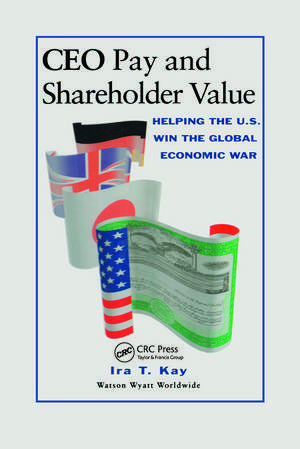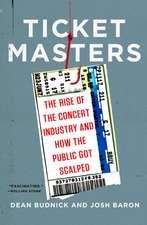CEO Pay and Shareholder Value: Helping the U.S. Win the Global Economic War
Autor Ira T. Kayen Limba Engleză Hardback – 11 noi 1997
Preț: 427.01 lei
Preț vechi: 552.09 lei
-23% Nou
Puncte Express: 641
Preț estimativ în valută:
81.72€ • 85.21$ • 67.92£
81.72€ • 85.21$ • 67.92£
Carte tipărită la comandă
Livrare economică 20 martie-03 aprilie
Preluare comenzi: 021 569.72.76
Specificații
ISBN-13: 9781574442038
ISBN-10: 1574442031
Pagini: 160
Ilustrații: 3 tables
Dimensiuni: 152 x 229 x 15 mm
Greutate: 0.41 kg
Ediția:1
Editura: Taylor & Francis
Colecția CRC Press
Locul publicării:Oxford, United Kingdom
ISBN-10: 1574442031
Pagini: 160
Ilustrații: 3 tables
Dimensiuni: 152 x 229 x 15 mm
Greutate: 0.41 kg
Ediția:1
Editura: Taylor & Francis
Colecția CRC Press
Locul publicării:Oxford, United Kingdom
Public țintă
Professional and Professional Practice & DevelopmentCuprins
Is There Pay for Performance?We All Benefit When CEOs PerformThe Role of Executive Pay in the Global Economic War: A Comparison of the United States, Japan, and EuropeThe Revolution in U.S. Corporate Governance and Its Impact on Executive CompensationSynchronized Pay: A Solution for Improving All-Employee PerformanceU.S. Executive Stock Ownership: A Source of Competitive AdvantageEpilogue: What if the Bulls Stop Running?Selected BibliographyAppendix A: Types of Long-Term Incentive PlansAppendix B: The Value of an Employee Stock Option: A Brief Discussion of the Black-Scholes Option Pricing ModelIndex
Descriere
Addressing the fundamental issue of whether or not CEOs are overpaid CEO Pay and Shareholder Value will help readers understand how business strategy, CEO pay, and long-term financial security are all linked. It explains how tying CEO performance to stock price benefits the U.S. economy; discusses how shareholders' interests can be aligned with those of executives and the broad employee population; considers the role of compensation programs in motivating growth, globalization, and efficiency; and compares U.S. economic practices with those of Japan and Europe, evaluating its global competitive advantage.












